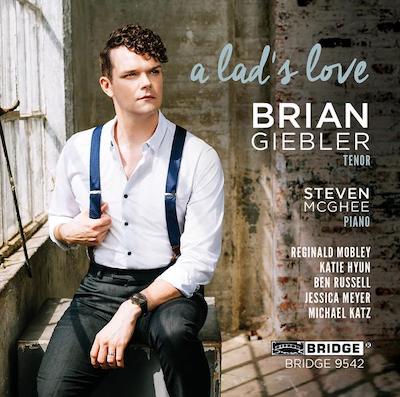by Jarrett Hoffman

In addition to duos featuring Giebler and pianist Steven McGhee, a lad’s love includes combinations less common. In a few instances, violinists Katie Hyun and Ben Russell, violist Jessica Meyer, and cellist Michael Katz join McGhee to form an accompanying piano quintet.
One such work is the opener, Ivor Gurney’s Ludlow and Teme. A must-listen, it’s the perfect introduction to Giebler’s bold, clear, and ringing tenor, and on at least one occasion his heavenly falsetto. It also shows off the skill and perceptiveness of the entire ensemble as they convincingly navigate a variety of moods.
That’s especially important because many of the songs in this cycle hang in the balance between contrasting frames of mind: wistfulness and desire, jauntiness and melancholy, romance and reality. Those contrasts are not only powerful in themselves, but also thematically: the album explores different emotions around topics such as youth, war, time, homosexuality, and love.
At the opposite end of the disc is another memorable sextet, “Because I liked you better” from Ian Venables’ Songs of Eternity and Sorrow (2004). The lone venture outside of the 20th century, its sound world still fits nicely into the tradition of English song. But its sadness is perhaps more forward and raw than any of the earlier material, making its impact at the conclusion of the playlist all the more stunning.
Another highlight is Benjamin Britten’s Canticle II: “Abraham & Isaac.” In the role of the father, Giebler fills his voice with religious conviction, while countertenor Reginald Mobley brings beautiful sensitivity to the son who gradually comes to terms with the idea of being sacrificed.
McGhee offers characterful underpinning in Britten’s sometimes quirky writing, and the pair of singers mingle and trade off parts with artfulness and precision. Most poignant is when, in the end, after Isaac has in fact been spared, Giebler and Mobley join together in “Amen” — a mirror image of the beginning, when they sang together as the voice of God.
Art-song duos by Britten, Peter Warlock, Roger Quilter, and John Ireland offer vivid pictures of emotion, and showcase the tight-knit partnership between Giebler and McGhee. In a few of them, the tenor hints at his experience in musical theater with an extra pure and straight-toned voice. And McGhee takes the spotlight in the solo-piano “Spring will not wait” from Ireland’s We’ll to the Woods No More, giving an expressive, ruminative performance.
With art song, it’s always helpful to follow along with the words, allowing you to immerse yourself more deeply in the poet’s world, and to see more clearly where both composer and performer make their musical choices. These liner notes offer links to view those texts online, but in the case of Britten’s cycle Fish in the unruffled lakes, the words turned out not to be available. One missed opportunity in an otherwise strong album.
Click here to purchase a lad’s love, and here to stream over Spotify.
Published on ClevelandClassical.com September 9, 2020.
Click here for a printable copy of this article



